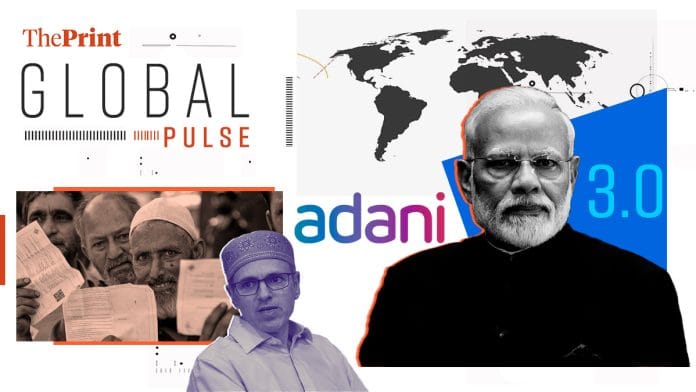New Delhi: Taking stock of the first hundred days of Prime Minister Modi’s third term—which happens to coincide with his birthday—The Economist declares unequivocally that he’s “having a tough time”.
In a long piece headlined “Narendra Modi starts losing battles”—with the subhead “a weakened strongman”—The Economist neatly dissects Modi 3.0. It might look similar to his first two terms, but dig deeper and significant changes emerge, it says: Modi and his new government has had to withdraw initiatives, face challenges from India’s courts, and also adjust his leadership style.
Further hazards loom, the piece says, pointing to upcoming state elections in Kashmir, Maharashtra, Haryana.
“But can Mr Modi really turn from strongman to consensus-builder? He has never had to share power before,” The Economist wonders. The RSS, too, has been unusually public in its criticism of Modi since he suggested he could be of divine birth, it continues.
But Modi “may yet master consultative government,” the piece concedes.
“And early signs suggest he has yet to adjust fully: he could, for example, have consulted more broadly on the recently withdrawn initiatives before putting them forward. Failure to adapt, meanwhile, could lead to further electoral losses and even a challenge to Mr Modi’s leadership from within,” it writes, before pointing to recent policy U-turns, like referring a new law on Waqfs to a JPC, recalling a new draft of the broadcasting services bill, and withdrawing its ad for lateral entry into the bureaucracy.
Modi seems to have hit many of his targets for his 100-day plan, but he had to adjust several parts of it. And that’s enough of a departure from his strongman image.
“None of this spells disaster for Mr Modi. It is early days and he has scored some important wins, quickly winding up government-forming talks with coalition partners and then tweaking his budget to allocate more money to job creation,” The Economist generously admits.
“Still, Modi 3.0 clearly needs more than continuity. It demands compromise too,” it concludes.
Such symbolic blows—and any potential threats of such—to Modi’s image seem to be making an impact on global media, which has sat up to take notice of Kashmir as it prepares for the first phase of its polls tomorrow.
The Washington Post carries an AP wire that simply states that people in Kashmir have tended to boycott elections for decades in protest against the Indian government, and that a large turnout is expected for the first election in Kashmir in a decade.
“But in the run-up to the local election beginning Wednesday, many are willing to buck that trend and use their vote to deny Prime Minister Narendra Modi’s party the power to form a local government in the disputed region,” the piece claims.
Bloomberg has a more detailed insight into the election process thanks to a sit-down interview with electoral frontrunner Omar Abdullah. Describing him as “Modi’s key rival in Kashmir,” Bloomberg reports that Abdullah’s priority is restoring statehood to Kashmir.
“While a victory for Abdullah’s coalition in the Jammu and Kashmir elections won’t threaten Modi’s federal government, it would be another symbolic blow for the prime minister’s strongman image,” Bloomberg observes. The story ends with a strong quote from Abdullah, who says reducing the state to a Union territory was done “simply to humiliate” Kashmir.
Meanwhile, eagle-eyed readers who also spend time on X might have noticed a fake press release from the Adani Group over an airport and some transmission lines it is building in Kenya.
In a dead giveaway, the fake release openly threatens to expose the names of Kenyan government shareholders who have benefitted from the Adani Group’s investments as well people who’ve taken their bribes.
The press release might have been fake, but the demonstrations currently taking place in Kenya against the Adani Group are not.
Al Jazeera reports that workers at Nairobi’s Jomo Kenyatta International Airport began protesting last week over Adani’s planned buyout—the deal leases the airport to the Adani Group for 30 years, in return for an investment of $1.85 billion.
The Kenya Airport Workers Union said the deal would “cut jobs and worsen employment conditions”. The one-day strike grounded flights and left passengers stranded, and the workers say they plan to keep protesting until the deal, which they say is “bad for Kenya”, is dropped.
“Adani must go. That is not optional,” Al Jazeera quotes the union leader as saying.
But it doesn’t look like Adani is leaving Kenya anytime soon.
The Kenya Electricity Transmission Company also awarded the Adani Group and a unit of the African Development Bank a public-private partnership concession to construct high-voltage power lines, Bloomberg reports.
“The Kenyan government has borrowed heavily and can ill afford to take on additional loans. To balance the need for continued investment in development, the government says it needs private money in public projects,” writes Bloomberg.






